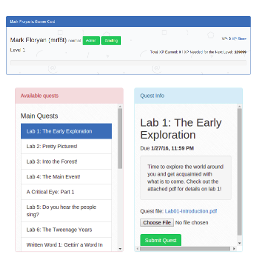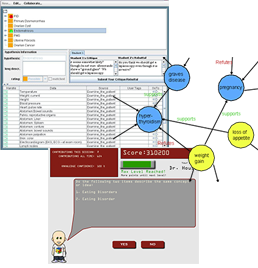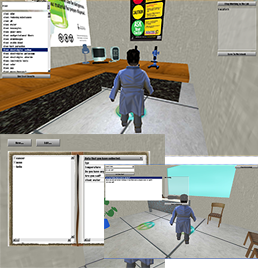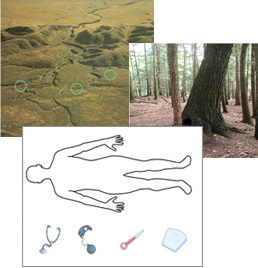Current Research Projects
-

Mastery Learning, Gamification, and Flexible Course Designs
I am interested in the ways in which mastery learning and gamification can be combined to create optimal learning environments at scale for college students. In the classroom, I have been testing many theories involving how these approaches can synergize. My courses often provide a huge amount of flexibility to students, always provide students a path to success, and provide students multiple chances to show knowledge.
On the research side, I am interested in investigating the utility of these approaches in a variety of ways. Which students benefit most from these flexible courses? Do some students benefit more than others? What are the drawbacks of providing this flexibility? How does mastery learning continue to scale? etc... -

ASCI: AI-Smart Classroom Initiative at UVa
For this project, we are trying to build tools that bring Artificial Intelligence into the classroom in ways that are scalable, and personable. The goal is to enhance the classroom experience at UVa by providing each student with a suite of tools that allow them to visualize their progress, be matched with optimal TAs and other peers, efficiently have questions answered when a human is not required, and other such tools.
We are actively adding features to the ASCI toolset and performing research analyses on their efficacy in the classroom. -

Bookmark: Critical Reading Game
Bookmark is a card game that supports student's improvement in critical reading skills. Students develop their own deck of cards after reading a text and play a board game in which they play cards to build chains off of other player's cards.
Bookmark is being used in middle schools in central Virginia, and we hope to continue studying its efficacy in the classroom. -

Gamercard: Gamifying College Coursework
This project focuses on the development and study of a tool called GamerCard that supports the gamification of college coursework.
The system supports using experience points (XP) and victory points (VP) for a unique articulation of grading systems. The system provides a store in which power-ups can be purchased, etc. We study the various ways gamification might improve college courses. -

Automatically Constructing Knowledge Bases by Crowdsourcing Student Data
For this project, we utilize student input to an intelligent tutor and automatically construct an Expert Knowledge Base. Expert Knowledge Bases are effective domain models for providing dynamic intelligent feedback. We mine large amounts of student input, and construct accurate domain level knowledge bases from this data.
In addition, we utilize game mechanics to improve the efficacy of our approach. We attempt to show that game like mechanics can improve student input. Additionally, we have designed Knowledge Refinement Games, which we use to crowdsource input that refines the knowledge in areas that are unconfident. -

Rashi Game: Effects of 3D Learning Environments
Rashi Game is a 3D educational experience based on the Rashi Intelligent Tutoring System (see below). Students take on the role of a doctor, explore a hospital, and attempt to diagnose patients. The purpose of this project is to begin to explore the differences between learning with traditional tutoring systems and educational games.
Rashi Game is unfortunately not currently available for download, but is coming soon... -

Rashi: Domain-Independent Inquiry Learning Tutor
Rashi is an inquiry based tutoring system used to teach various subjects through exploration. Students are invited to explore specific cases in their field. They form hypotheses, collect data, and collaborate with others. Rashi implements cases in various fields such as Biology, Art History, and Forestry.
If you would like to try out Rashi, the download and instruction can be found at This Website. Enjoy!
